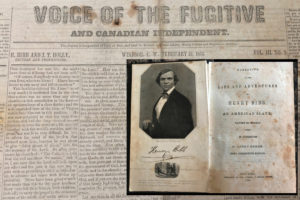Henry Walton Bibb (1815-1854). Born into slavery of a black mother and a white father he never met (Kentucky State Senator James Bibb), Henry was powerless to prevent his six younger brothers from being sold away. Young Henry was hired out for some nine years to fund the education of his childhood playmate, Harriet White, the daughter of his owner, a Native American Indian. Denied an education, he memorized everything he heard, especially concerning freedom, and became a master of escape, often absconding for days at a time and suffering the consequences when caught.
In 1833, Bibb married another Mulatto slave, Malinda (a common-law arrangement as marriage was forbidden most slaves), and had a daughter. Hoping to deliver his family to freedom, Bibb crossed the Ohio River into the free state of Indiana in late-1837, and, meeting members of the Underground Railroad, was able to reach Canada where he was able to find work and save money. Returning to his family in Kentucky, he made plans for their escape and awaited them in Cincinnati. There he was betrayed by two men posing as abolitionists who obtained the name and address of Bibb’s owner. He was recaptured, this time to be sold further South. His captors marched him through city streets to the slave auction in Louisville and, upon reaching a corner, Bibb turned and dashed away. A $50 reward was paid for his eventual return to a slave prison where, by chance, he was reunited with his family. Together again, they were sold to a horribly abusive and neglectful master who caused the loss of their second child.
The escape-return-recapture scenario was repeated many times until 1842, when he made his way to Detroit, Michigan. Returning to Kentucky again in hope of a reunion, he learned Malinda was living with another man and had given up on her husband’s dream of freedom. Despite heartbreak, Bibb responded by appearing on the American lecture circuit for abolition, and later wrote and self-published an autobiography detailing his oft quoted adventures.
At right, the 1850 third edition of Henry Bibb’s slave narrative features his portrait and a small sketch of his Louisville, Kentucky escape, images not depicted in the 1849 first and second editions. It became one of the best-written and most insightful of the antebellum period. Written by a man with but three weeks of formal education, yet with a preface citing, “… I would not attempt by any sophistry to misrepresent slavery in order to prove its dreadful wickedness. For, I presume there are none who may read this narrative … but what will admit it to be a system of the most high-handed oppression and tyranny that ever was tolerated by an enlightened nation.” The episodes so poignantly depicted Bibb’s suffering and endurance, bold, ingenious escapes, and evocative American landscapes, that the Detroit Liberty Association ordered a full-scale investigation to allay public incredulity. Correspondence with Bibb’s former associates, “slave owners, slave dealers, fugitives from slavery, political friends and political foes” alike, revealed Bibb’s account to be “corroborated beyond all question.”
Passage of the 1850 Fugitive Slave Act presented a new threat to Henry and his second wife, Mary. After fleeing to Windsor, Canada, and though he had little publishing experience, the Bibbs began the first black newspaper in Canada, The Voice of the Fugitive, from 1851 to 1853 (above left, the Feb. 22, 1853 edition). This now incredibly scarce newspaper served to foster sympathy among Canadians as well as helping new arrivals to adjust. Bibb solicited, organized, and co-managed sizable funds donated by American abolitionists to buy large tracts of arable land to offer to new and prospective black farmers, providing training, seed, livestock, and the tools to help them succeed.
Bibb was reunited with three of his six brothers who, in 1852, individually escaped southern slavery to join him up North. This brilliant, caring, and resourceful man passed away just two years later at 39, but many of the descendants of the forerunners he assisted still prosper in those northern provinces.


